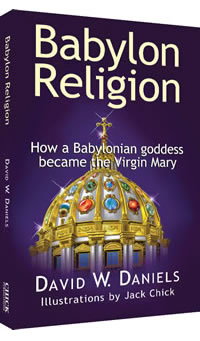Pope Preaches Purgatory: More Proof that Roman Catholicism Isn't Christian
In his weekly speeches at the Vatican, Pope John Paul II took up the subject of the afterlife during July. Heaven, hell and purgatory were dealt with in a three-week series in which he declared that all three were not physical places but states of being.
According to the pope, heaven is, basically, existence in the presence of God while the pain of hell is caused by eternal separation from God. Many Protestant theologians would not argue with this, although the Bible contains very physical descriptions of the New Jerusalem in heaven, and hell being a place of fire and darkness.
However, the pope's description of purgatory illustrates how a false doctrine can help distinguish a whorish Christian cult from the true church of Christ. A prostitute may look and act like a wife but in reality she is only an imposter.
Through this Roman Catholic doctrine, we see more clearly how the Roman Catholic salvation is a process of works instead of an event when the person accepts the gift of Christ's sacrifice done once for all and becomes instantly a new creature in Christ.
The word purgatory comes from the root word "purge" and aptly illustrates the heart of this Roman Catholic dogma. The pope says, "...the journey toward full beatitude (happiness in heaven) requires a purification." To enter heaven, he says, "Every trace of attachment to evil must be eliminated, every imperfection of the soul corrected. Purification must be complete..."
Instead of this happening through the blood of Christ shed on the cross, the dead person must endure personal anguish to atone for his category one, or venial, sins. Category two (mortal) sins automatically condemn you straight to hell if not repented of and forgiven by a priest before death. Purgatory is only for the lesser sins.
Descriptions vary as to the intensity and nature of the purging process. Some teach that it is like a lake of fire where the souls of the dead cry out in real, physical agony, using a temporary, substitute body given them for this purpose. Here the pope only refers to it as a "state of purification" of those who "are already in the love of Christ" and not a second chance to "change one's destiny."
At the end of his message the pope is careful to point out that those in purgatory are "...united both with the blessed who already enjoy the fullness of eternal life, and with us on this earth on our way towards the Father's house." This gets us to the bottom line: money!
Catholicism's doctrine of the "communion of the saints" teaches that those in heaven can receive messages from those on earth (prayers to the Virgin Mary goddess and other dead "saints") and those in purgatory can be aided in their suffering by actions and prayers of those yet alive. The primary action by the living is to pay the Roman priests to say masses for the dead. Since the priest cannot tell how many masses it will take to get a dead relative out of purgatory, this becomes a perpetual source of income and often contributes to the widespread poverty of lay people in cultures dominated by this false church.
For a thorough discussion of the doctrine of purgatory, see the comprehensive book A Woman Rides the Beast, by Dave Hunt, available from Chick Publications.
In an appendix of this book, Hunt points out a fatal contradiction of logic. Since Christ's sacrifice was not enough to purge our sin, purgatory is necessary. But time in purgatory can be shortened by the Mass in which a priest sacrifices Christ all over again. What good is this if Christ's sacrifice was not enough in the first place?
In his speech, the pope admits that the doctrine of purgatory is not "formally described" in Scripture. He then quotes Bible verses on God requiring punishment for sins. But the doctrine, by its very nature denies that Christ's suffering on the cross for our sins is adequate punishment for our sins.
- See more articles on related topics:
- Catholicism
- Hell
- Purgatory
- Catholic Doctrine vs Scripture
Other Articles from September/October 1999:
More on Catholicism:
Products of Interest:
-

Answers To My Catholic Friends
64 pages
A gentle witness you can give Catholics that deals with venerating images, purgatory, where popes go when they die, and more. -

Babylon Religion
224 pages
Learn how a Babylonian goddess became the Virgin Mary. An easy-to-read history of Catholicism's Babylonian origin. -

Smokescreens
96 pages
Jack Chick shows that the ecumenical movement isn’t designed to bring all Christians into unity. That’s just a smokescreen, hiding the Vatican’s real intent, to stamp out religious freedom and rule the world. -

Alberto
32-PAGE, FULL COLOR COMIC BOOK - Alberto Series Part 1 - Here is how Alberto, as a Jesuit, helped destroy churches and ministries. But as he read the Scriptures, he saw that Catholicism couldn’t save.



